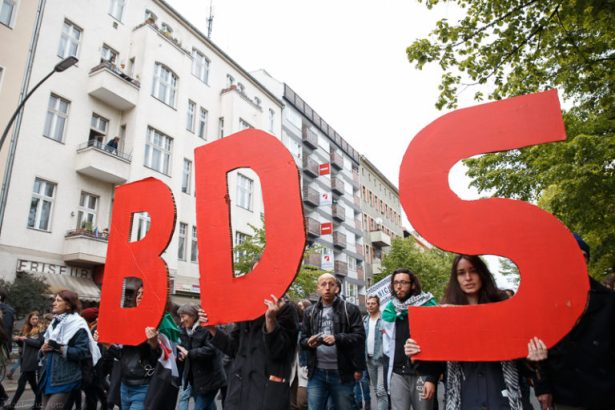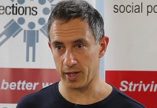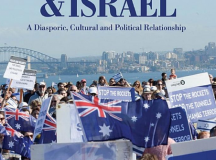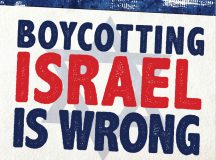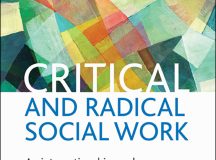Philip Mendes is Director of the Social Inclusion and Social Policy Research Unit in the Department of Social Work at Monash University, Australia.
Since the 7 October Islamo-fascist death squad massacre, Australia has experienced an unprecedented outbreak of anti-Semitism. Some of the more acute manifestations of this anti-Jewish xenophobia include the following:
– Aggressive and threatening invasions of Jewish-populated suburbs in the cities of Melbourne and Sydney by pro-Palestinian mobs;
– The doxing (release of highly personal details online) of hundreds of Australian Jews who were participating in a private online group to combat anti-Semitism; and Jews being forced to leave workplaces and even residences due to ongoing threats and harassment;
– Jewish university students and academics being subjected to various forms of defamation, threats and hate speech by university-based encampments and associated forums, flyers and graffiti intended to exclude them from academic and public discourse;
– A general atmosphere of McCarthyist intolerance towards Jews in key progressive communities – the arts, some trade unions, online journals such as Overland that have become uncritical sites for anti-Jewish hate speech, some sections of the media, the Australian Greens political party, sub-cohorts of some social science professions – which is akin to that experienced by Communists and other leftists in the USA and Australia during the Cold War. The question ‘Are you or have you ever been a Communist’, which often disproportionately targeted Jewish leftists in the USA and other countries, has now been reframed to impose a political test on whether or not a Jewish person is to be defined and excluded as a ‘Zionist’.
Whilst these events are connected to the views of some Australians regarding the ongoing war between Israel and Hamas, I argue here that they are mostly not a direct reaction to the current tragic and polarising loss of life in the Middle East. Rather they reflect a deliberate strategy by the Australian BDS movement to vilify the Australian Jewish community, and it should be added, to apply a hate-based framing that bears no relation to the highly varied views of that community on recent Israeli and Palestinian actions. As noted by the leading US scholar Cary Nelson (2024: 109), there is no doubt that the BDS movement everywhere creates a climate of hostility towards Jewish students and academics in particular that is overtly anti-Semitic.
In an earlier 2015 book, Nick Dyrenfurth and I documented the malevolent history of the Australian BDS movement from its origins in May 2002. We noted that the Australian movement shared the chauvinistic views of the global BDS movement in favour of the elimination of the State of Israel to be replaced by an ethnocentric Arab state of Greater Palestine. We also highlighted the movement’s racist stereotyping of all Israeli Jews as evil oppressors – irrespective of their family background, their class, or their political views towards Israeli recognition of Palestinian national rights. One infamous example of this essentialisation of all Israelis was the aggressive boycotting by the University of Sydney’s Centre for Peace and Conflict Studies head, Jake Lynch, of the prominent Israeli progressive academic, Dan Avnon (Mendes & Dyrenfurth, 2015: 97-98). Lynch’s adolescent-style boasting of his actions on social media seemed to symbolize the BDS movement’s absolute determination to eschew any dialogue with moderate Israelis that might potentially advance peace and reconciliation in the Middle East via two states or any other mutually negotiated solution.
We also warned in our book that the BDS movement’s racial hatred for Israeli Jews was extending to Australian Jews. One example of such bigotry was Jake Lynch’s bizarre argument that Jewish financial pressure was responsible for the Australian Labor Party switching leaders (and hence Prime Ministers) from Kevin Rudd to Julia Gillard in 2010 on the grounds that Gillard was more pro-Israel than Rudd (Mendes & Dyrenfurth, 2015: 95-96).
So it was hardly surprising after 7 October that the local BDS operatives quickly transformed their agenda from racist targeting of all Israeli Jews, to additionally targeting all pro-Israel Jews who were conveniently labelled as ‘Zionists’ regardless of their widely diverse political opinions – that is whether they were hawks who supported Netanyahu and Likud, or Peace Now supporters who wanted a Palestinian state alongside Israel tomorrow rather than the day after, or even non-Zionists and some anti-Zionists who were devastated by the Hamas death squad massacre and demanded an end to violence from all sides.
In doing so, they joined a long historical line of ‘progressive’ anti-Semites who have used Zionism as a code word to disguise racist hatred against Jews. That application was most evident in the Stalinist anti-Semitic campaigns of the early 1950s. For example, the Slansky show trial in Stalinist Czechoslovakia in July 1952 involved 14 leading Communists including 11 Jews (nearly all of whom were life-long anti-Zionists) who were accused of leading an international conspiracy designed to undermine the Communist countries. The interrogations and trial were distinguished by their explicit anti-Jewish character, but the public statements released to the western media used the term Zionist rather than Jew in an attempt (majorly successful) to con Western progressives into believing the trials were not anti-Semitic (Mendes, 2014: 72-73).
The convergence of political anti-Zionism and xenophobic anti-Semitism resumed in the late 1970s when British student unions attempted to exclude Jewish student bodies from membership on the essentialist grounds that they were all racist Zionists (Mendes, 2014: 90). And similarly, dissident Marxists coopted the old orthodox Soviet argument that Zionists (read Jews) had collaborated with the Nazis to perpetrate the Holocaust as in Jim Allen’s 1987 anti-Semitic play, Perdition. The literary critic of the New Statesman journal, Virginia Radin, exposed at the time the play’s malevolent reversal of Nazi perpetrators and Jewish victims:
Blame is a word that Allen has continually attached not to the Nazis, but to the Jews/their Jewish leaders/Zionists. It is the venerable psychological mechanism by which the victim stands accused; the rape victim of soliciting violence; the slave of colluding with their masters (quoted in Mendes, 2014: 87).
Similarly since 7 October, the use of Zionism as a codeword to disguise the presence of discriminatory, chauvinistic, xenophobic anti-Semitism has become the calling card of the Australian BDS movement. Its most honest expression came from an Australian Palestinian academic who bluntly declared that ‘Zionists have no right to cultural safety’ (Quoted in Visontay, 2024). This statement seemed to mean that anti-Semitism was an acceptable form of racism, and Jews have no right to be defended against anti-Semitism because they are defending Israel’s actions. One can imagine this academic would not react kindly if a similarly bigoted Jewish person equated all Muslims with Hamas, and argued on that basis that Islamophobia was an acceptable form of prejudice.
Similar views were expressed by an Australian Greens member of the New South Wales State Parliament at an event hosted by the Palestine Justice Movement on 13 December 2023 in Sydney. That forum, which acclaimed the role of the BDS movement, featured five speakers including leading Australian BDS advocate Nick Riemer, and NSW Greens State member of Parliament Jenny Leong. Leong presented arguably one of the most anti-Semitic statements by a mainstream Australian politician in more than five decades. Using racist rhetoric reminiscent of early-mid 20th century far Right anti-Semitic conspiracy theories, she alleged that Jews secretly infiltrated political movements solely in order to promote their own narrow interests and power:
Another BDS supporter, who seems to come from a white Anglo-Australian background, applied a bizarre form of psychobabble to dismiss concerns about anti-Semitism on campus. She alleged that Jewish students who said they were feeling unsafe were obviously being disingenuous because all they were exposed to was what she termed ‘political discomfort’ associated with protests against Israeli actions (Rudolph, 2024) This academic displayed nil insight into Jewish experiences of historical oppression in both the Global North (Nazi Holocaust) and Global South (mass ethnic cleansing from Arab and North African Muslim-majority countries), and associated intergenerational trauma. She dismally failed to interrogate why Jewish students and academics might feel threatened by inflammatory racist signs at Australian universities stating that ‘Zionists are not welcome’.
Leading Australian BDS advocate, the linguistics specialist Dr Nick Riemer, advanced a complete convergence of political anti-Zionism and racist anti-Semitism in two further articles. In one article co-authored with literary studies specialist Jumana Bayeh, he/they made 20 separate references to the role allegedly played by what was called a ‘powerful Zionist lobby’ active in Australian universities and higher education and wider political parties and movements in opposing the extremist BDS movement. What they actually implied was the racist assumption that Australian Jews have no right to express alternate opinions to binary pro-Palestinian nationalist perspectives that favour the elimination of the State of Israel and the ethnic cleansing and/or violent slaughter of its population. They also oddly denied any link between anti-Zionism and xenophobic anti-Semitism, whilst making the evidence-free claim that Zionist lobbyists and donors (i.e. the stereotype of powerful wealthy Jews) ‘exert significant influence on Vice-Chancellors and university governing bodies’ (p.9).
In a further article, Reimer (2024) extends his application of traditional far Right stereotypes of Jewish power and influence by alleging that powerful ‘Zionists’ control academic institutions in western countries, and actively silence expressions of support for Palestinians on behalf of Zionist (read Jewish) ‘donors’. He absurdly insists that pro-Palestinian groups seek to advance universal values such as equality and justice, whilst at the same time ethnocentrically urging that the national and human rights of Palestinian Arabs be actively privileged over those of Israeli Jews. For Reimer as for many pro-Palestinian fanatics in western countries, anti-Semitism is invisible. Those Jews who feel unsafe because they are being vilified, harassed, defamed and attacked by racist supporters of Palestinian nationalism are according to Reimer complete liars. Their lived experience voices do not deserve to be heard.
Most disappointing has been the extension of these forms of anti-Semitism to the social work profession that I have worked in as a practitioner and academic since 1987. In an earlier article reflecting on poisonous debates within the British social work profession, I warned that sections of the profession were being captured by a pro-BDS perspective that privileged and validated Palestinian/Arab national rights over Israeli/Jewish national rights, and attempted to silence any effective solidarity by social work organisations concerning Jewish experiences of anti-Semitism in the Global North or Global South. I urged the mainstream social work profession to reject this evidence-free construction of an hierarchy of oppression, and instead apply its stated universalistic beliefs in social justice and human rights for all (Mendes, 2023).
In Australia, a small group called Social Workers for Palestine Australia (led by an Anglo-Australian Socialist Alliance-affiliated local councillor in Rural Victoria) has emerged which has advocated discrimination against both Israeli Jews and Jewish Australians. Initially, the SWFP and three aligned organisations – Australian Palestine Mental Health Network, Families for Palestine, and Mental Health Workers for Palestine – bullied the Australia and New Zealand Mental Health Association to rescind an invitation to Dr Moshe Farchi, Head of the Social Work Department in Tel-Hai Academic College, Israel, to be a keynote speaker at their March 2024 Frontline Mental Health conference on ‘Psychological First Aid’.
Subsequently, these four groups have also started targeting Australian Jews, arguing, for example, in a defamatory online petition that one prominent social work academic was a ‘Zionist and racist nationalist’, and hence not a suitable person to work as either a social worker or academic. They are particularly angry that the Australian Association of Social Workers has adopted what they consider to be an unreasonably neutral and dispassionate tone on the Israeli-Gaza conflict, insisting instead that all social workers should unequivocally endorse their anti-universalist support for hardline Palestinian nationalism (Young, 2024). But to date, only 882 social workers have signed their petition which uses the hierarchy of oppression discussed above to argue that only Palestinians (not Jews) experience racism and oppression and intergenerational trauma, and conversely that Palestinians are never perpetrators of racism and oppression. It remains unclear whether all those signatories are qualified social workers, or even resident in Australia. Regardless, that number is only a tiny percentage of the estimated 42,000 social workers employed in Australia which suggests optimistically that most Australian social workers don’t accept their racist assumptions (Australian Government, 2024).
The Australian BDS movement and its allies have displayed nil insight into the anti-Semitic impact of their hostile actions towards Australian Jews. Indeed, what has been most common is their sleazy determination to subvert the evidence, and instead bizarrely insist that they are the peaceful victims of so-called violence from right-wing ‘Zionists’ (Overland Editorial Team, 2024; Sparrow, 2024), rather than proudly owning their attacks on the Jewish collective.
Australian Policy makers attempting to combat this anti-Semitic intolerance will need to take a long-term approach given the entrenched nature of these racist and illiberal views within sections of academia and the wider community. Any effective anti-racist strategy to defend the Jewish community will arguably need to be informed by two key principles:
1) Only perpetrators, never victims, are responsible for anti-Semitism;
2) Anti-racist solidarity with the Jewish community must include an absolute privileging of Jewish lived experience voices of anti-Semitism.
References
Australian Government (2024) Social Workers. Jobs and Skills Australia.
https://www.jobsandskills.gov.au/data/labour-market-insights/occupations/2725-social-workers.
Bayeh, Jumana & Riemer, Nick (2024) ‘Palestine solidarity and Zionist backlash in Australian universities’, Middle East Critique, https://www.tandfonline.com/doi/full/10.1080/19436149.2024.2334147.
Mendes, Philip (2014) Jews and the Left: The rise and fall of a political alliance. Palgrave MacMillan. https://link.springer.com/book/10.1057/9781137008305.
Mendes, Philip & Dyrenfurth, Nick (2015). Boycotting Israel is Wrong: The progressive path to peace between Palestinians and Israelis. New South Press. https://unsw.press/books/boycotting-israel-is-wrong/.
Mendes, Philip (2023) ‘Empowering the lived experience voices of Arabs but not Jews: The attempted subversion of universal social work values by the extremist Boycott, Divestment and Sanctions (BDS) movement’, Migration und Soziale Arbeit (ISSN 1432-6000), Ausgabe 1, Jahr 2023, Seite 35 – 44.
Nelson, Cary (2024) Hate speech and academic freedom. Academic Studies Press. https://www.academicstudiespress.com/9798887194202/.
Overland Literary Journal Editorial Team (2024) ‘Concerning open letters’, Overland, 20 May, https://overland.org.au/2024/05/concerning-open-letters/.
Riemer, Nick (2024) ‘Resisting the Israelisation of Western universities’, Overland, 6 May, https://overland.org.au/2024/05/resisting-the-israelisation-of-western-universities/.
Rudolph, Sophie (2024) ‘Working for safety collectively’, Overland, 5 June, https://overland.org.au/2024/06/working-for-safety-collectively/.
Sparrow, Jeff (2024) ‘Why conservatives are so afraid of the Palestine solidarity movement’, Overland, 15 May, https://overland.org.au/2024/05/why-conservatives-are-so-afraid-of-the-palestine-solidarity-movement/.
Visontay, Michael (2024) ‘Controversy over pro-Palestinian advocate judging multicultural award’, The Jewish Independent, 11 April, https://thejewishindependent.com.au/pro-palestinian-advocate-judged-multicultural-award.
Young, Janelle (2024) ‘You who master silence: Resisting mainstream social work’s hypocrisy on Gaza’, Overland, 30 May, https://overland.org.au/author/janelle-young-2/.

